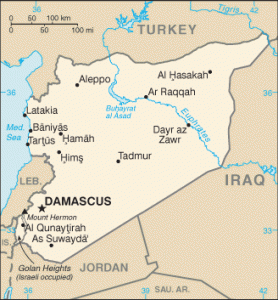Syrian military forces shelled neighborhoods in Damascus on Thursday, a day after rebels bombed a government building in the capital, killing three senior regime officials close to President Bashar al-Assad.
 As the violence seems to escalate to new levels, Russia and China – wary of Western intervention against Assad – vetoed a US-backed United Nations Security Council resolution threatening the Syrian government with sanctions.
As the violence seems to escalate to new levels, Russia and China – wary of Western intervention against Assad – vetoed a US-backed United Nations Security Council resolution threatening the Syrian government with sanctions.
Fighters from the Free Syrian Army on Thursday claimed to have seized control of one of Syrian checkpoint along the border with Turkey, called Bab al Hawa, and released what they described as video footage of their fighters at the site. But other reports demonstrate the battle for control there is still underway.
The increase in rebel capacity to hit the Assad regime – and the regime’s violence response – is probably due to the arms and coordination being given to the opposition by the US and its allies. But UN rights chief Navi Pillay last month condemned the continued flow of weapons from foreign powers to both sides in the Syrian conflict.
“The ongoing provision of arms to the Syrian government and to its opponents feeds additional violence,” she said in the text of remarks made to the Security Council. “Any further militarization of the conflict must be avoided at all costs.”
As Western leaders hail the impending doom of the Assad regime, others caution such moralizing celebration. “Even if [Assad] goes there’s a lot of post-Assad issues for which nobody is really prepared — the price of the fragmented opposition and power of armed groups,” says Marc Lynch, an Obama administration consultant and Middle East expert at George Washington University who has consistently and publicly opposed direct US intervention, including arming of rebels.
Both sides in Syria are still being supported by outside powers, which has emboldened opposing actors and for months made a political solution more remote. It’s hard to tell through the media hype, but the conflict may now have reached a point of no return. As Jordan’s King Abdullah said “I think the clock is ticking and we have … reached the point where the political option is too late.”





Before Jordan intervenes militarily, I hope someone will remind the King that it was the alliance of the Hashemites with the Arab nationalists of Syria that could have gained the Arab people their freedom in 1918. Maybe then Jordan would summon the courage to stop being lackeys of the US and Britain or Israel's battered spouse and be on the right side in the anti-imperial struggle.
There is no "increase in rebel capacity to hit the Assad regime" antiwar is just distributing the theater dramaturgy of USA guerrilla warfare.
An suicid bomber could without any problems find a target in Damascus at the first day of this dirty war. But this way, it looks advancing, What a dirty game !
Syria also should use suicid bombers to kill Obama or Clinton – 600.000$ the price should it be worth. Otherwise innocent people and children will die.
USA must be stopped in their series of secret guerrilla wars, used as justification for their fake "Humanitarian wars"
That's why the rebels just blew up the defense minister and Assad's brother-in-law inside the National Security building.
Seriously, there's opposing the Syrian rebels, and then there's just refusal to see reality.
Which reality? What do you know about the bombing? Does it mean having probably a high ranking traitor at a top level security meeting that "rebels" won? Let's be serious.
I would classify a successful decapitation strike as a win, wouldn't you?
If US equivalent office holders would have met the same fate, does it mean US was defeated? I'm all in favor to make this a general rule for winning (civil) wars.
> there’s a lot of post-Assad issues for which nobody is really prepared
One can only hope for the best, but it's probably going to get ugly.
Just listened to French radio; the concept that "Syria" and "The Syrian People" is some kind of homogeneous unit seems to be taken for granted. Bad thinking.